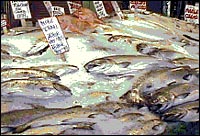
There’s no shortage of reasons it would really suck if present trends continued and the world’s oceans stopped supporting a robust fish population.
For one, it would deal a devastating blow to human nutrition and cuisine. The sea provides us with high-quality protein and many other valuable nutrients. Poof? Gone? (Don’t be smug, vegans. Fish emulsion — ground-up fish — is a common and valuable input for organic vegetable farming.)
As for cuisine, can anyone really bear to contemplate Southeast Asian food without fish? Then there’s Italian. No spaghetti alle vongole (clams)? Or that immortal Sicilian dish, pasta con sarde (sardines)? What, the southern French won’t get to make bouillabaisse, the Basques will be robbed of their cod, the coastal Mexicans can no longer do hauchinango al mojo de ajo (garlic-crusted red snapper)? What will become of Vera Cruz? Of New Orleans?
No. This is wholly unacceptable. It won’t do. Such a world does not interest me. Present trends must not continue; they must end immediately.
Thank God, Worldwatch Institute has come out with a plan promising a way out of this abyss.
Happily, Worldwatch isn’t ordering us to immediately stop consuming seafood (though if that were the only way to preserve the oceans’ long-term status as a food source, I’d be on board).
The report claims that through smarter fishing and careful stewardship, active human intervention can restore the health of the sea and its precious creatures. What we have here is what the economists call a colossal “market failure”; what’s needed is swift, draconian, and concerted government action, backed by enlightened consumer choice.
According to Worldwatch, the report shows that “that being a more deliberate seafood eater doesn’t mean a spartan existence; in fact, it could be the only guarantee that fresh and healthy fish continues to appear on our tables.”
Like the guy says at the end of The Sun Also Rises, “Isn’t it pretty to think so?”


